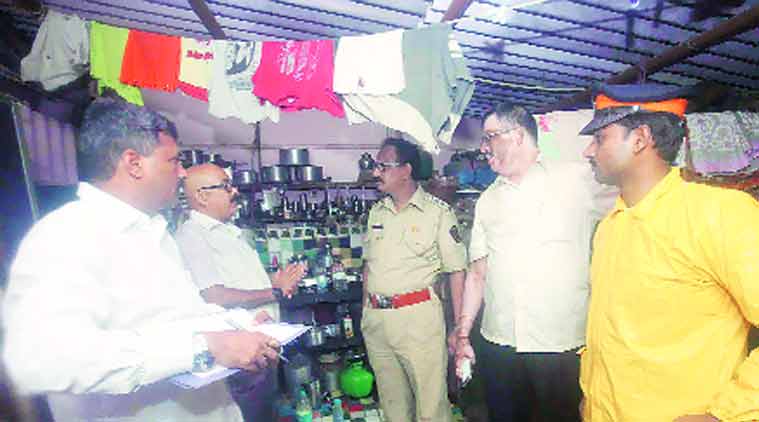Stay updated with the latest - Click here to follow us on Instagram
Hooch Tragedy: Methanol poisoning suspected, police await lab reports
According to sources in the department, this is the first time since 2004, when 80 people died in Vikhroli after consuming spurious liquor, that methanol has been used.
 Police raid the house of Akka alias Mamta, who they suspect supplied the illicit liquor, on Friday. (Source: Express photo by Dilip Kagda)
Police raid the house of Akka alias Mamta, who they suspect supplied the illicit liquor, on Friday. (Source: Express photo by Dilip Kagda)
Officials of the state excise department, which is assisting Mumbai Police in its probe into the hooch tragedy in Malwani, say that the sale of methanol, the substance suspected to have been mixed in the alcohol, is not regulated in Maharashtra.
While investigators await the report of Kalina Forensic Sciences Laboratory, they have been informed by officials at Shatabdi Hospital that prima facie the residents of Laxmi Nagar died of methanol poisoning.
“Methanol is not regulated in Maharashtra and does not come under the purview of the excise department,” said Prasad Surve, Director (Enforcement), excise department.
[related-post]
According to sources in the department, this is the first time since 2004, when 80 people died in Vikhroli after consuming spurious liquor, that methanol has been used.
“The use of methanol is very uncommon, and dangerous,” Surve said.
Methanol, a very basic form of alcohol, is unfit of human consumption and is known to result in loss of vision and difficulty in limb movement and can also lead to death. Surve said that in spite of its toxic nature, methanol continues to be easily available in small quantities.
The arrested people are alleged to have procured methanol and mixed it with alcohol brewed at an unidentified location and supplied it to the main accused, Raju Langda.
“Mixing methanol turns the alcohol pink in colour and lends it a very bitter taste. It is possible that the distributors faced a surge in demand and used methanol to make the alcohol stronger,” Surve said.
The excise department office in Malwani is manned by eight men – four officers and four constables – and its jurisdiction includes all of Malad, Malwani and parts of Kandivali.
“Excise officers patrol an area at a time in pairs and bootleggers operate in other areas. It is very difficult to monitor slums areas,” Surve said.
Alcohol, Surve added, is often produced in small shanties in slums and centres of production and distribution change frequently, making detection difficult. “We do receive information of alcohol being produced and sold illegally and conduct raids, but the locations keep changing,” he said.







